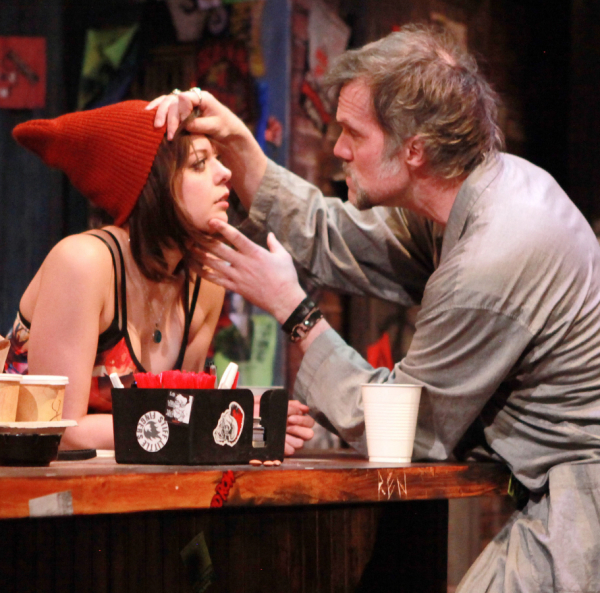The Undeniable Sound of Right Now

(© Sandra Coudert)
Hank's Bar, the setting of Laura Eason's The Undeniable Sound of Right Now, is one of those historic Chicago rock clubs, the kind of joint where the Clash played a secret set one night and Stevie Nicks belted "Crying in the Night" alongside Hank himself. Hank, of course, is a fictional person, his dive a fictional location. But the vividness with which Eason brings Hank's to life, in this world premiere coproduction of Rattlestick Playwrights Theater and the Women's Project, transports viewers to a different era, one where there was an actual element of danger to the music we listened to and the places where we listened.
The "sound of right now" is DJ-spun house music, electronic dance tunes, which, in the 1980s, grew in fame across Chicago through all-night parties and warehouse raves. For Hank (Jeb Brown), who's spent the past 25 years as a tastemaker and influencer in the rock and punk scene, its popularity is an imminent threat to his survival. And when his 20something daughter, Lena (Margo Seibert), starts dating Nash (Daniel Abeles), a rising-star DJ with big dreams, Hank is faced with decisions he never wanted to make.
While the overarching theme is gentrification and the gradual destruction of legendary venues (calling to mind the late CBGB), at its heart The Undeniable Sound of Right Now is an emotional love story between a particularly unconventional father and daughter. Nash is a threat to Hank not only because he represents the world's changing taste in music, but also because he could be the one who takes Lena away, and Hank is not ready to let go of the daughter he raised on his own and loves so much. As the play continues, it becomes clear that Lena is truly her father's daughter.
Kirsten Kelly's production is steeped in authenticity, which she draws out of both her actors and creative team. Even more depth is added to Eason's compelling play through John McDermott's set, which transforms the tiny Rattlestick stage into a dive bar so realistic you can almost smell the liquor and cigarettes hanging in the air. Sarah J. Holden's grungy late-'80s/early-'90s costumes are just as credible, feeling more like thrift-store finds than contemporary re-creations of the period. Props designer Judy Merrick adds to the flavor through the walls full of clutter in the form of advertising flyers and music posters.
At the play's center are two first-rate performances. As Hank, the flawless Brown is a shaggy would-be rocker gone to seed, with an unpredictable temper and an insatiable desire for the world to stay exactly as it was when he was a kid with no responsibilities. As his punk-princess daughter Lena, Seibert is similarly impeccable, both in look (her layered hairdo and leather jackets are spot-on), and in the intricate range of emotions she displays through the course of the 95-minute play. Hank and Lena's undying affection for each other is palpable, especially in the play's final scenes. Supporting cast members — Abeles as Nash, Lusia Strus as Hank's ex-wife Bette, Brian Miskell as Hank's booker Toby, and Chris Kipiniak as Joey the landlord — all hold their own, even when the plot takes a turn into predictable territory.
In an era where all of the old music venues, bars, and diners are closing down, it's undeniable how timely and contemplative Eason's play truly is. Long live Hank's, and all of the other places of historic value taken from us before their time.










